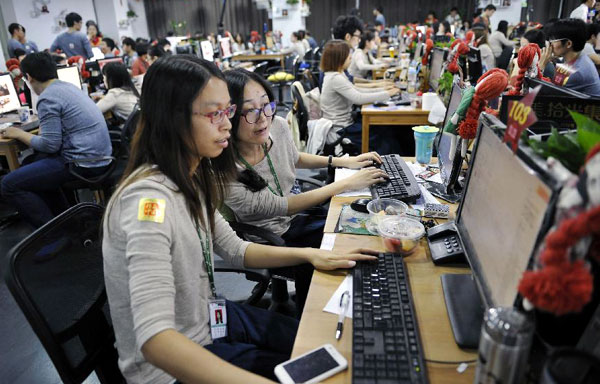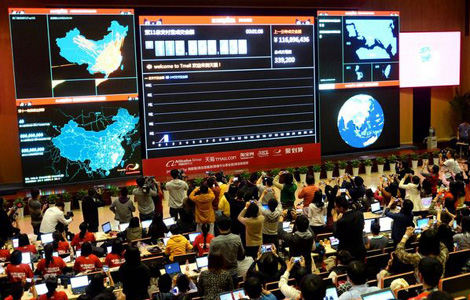Online shopping records beaten as new era beckons
Updated: 2013-11-12 09:52
(Xinhua)
|
||||||||
|
 Staff members from a female dress brand work late at night at the Haizhu Creative Industry Park to welcome the coming "Singles Day" in Guangzhou, capital of South China's Guangdong province, Nov 10, 2013.[Photo / Xinhua]
|
BEIJING -- During a meeting with Chinese Premier Li Keqiang two weeks ago, Alibaba's founder and chairman Jack Ma made a bold prediction. "We expect 30-billion-yuan-plus ($4.9 billion) in online turnover on November 11," Ma said.
Taobao.com and Tmall.com, key sales platforms under the Alibaba Group, operator of China's biggest e-commerce platforms, offered big discounts throughout Monday, or Singles' Day.
By 1:04 p.m., after 13 hours of sales, turnover stood at 19.1 billion yuan ($3.1 billion). The amount was the same for the whole of Singles Day last year.
By 9:19 p.m., turnover has exceeded 30 billion yuan.
"Many products sold out in a flash," said Xu Yun, 24, who stayed up till 3 a.m. and spent 2,800 yuan on clothes and cosmetics, paying 50 percent less. "I have bought enough for the upcoming winter," Xu said.
Sales surpassed 100 million yuan less than a minute after the sale started at midnight. More than 10 million people like Xu were waiting to start shopping.
Singles' Day, on November 11, became popular after Alibaba tagged it China's version to Cyber Monday.
"Under the surface of buying products at a lower price, the public are actually enjoying the benefits brought by market-oriented progresses in logistics, financial environment and e-commerce," said Ma.
Alibaba saw a whopping 1 trillion yuan in turnover last year, more than eBay and Amazon combined.
In 2012, China's online retail sales volume reached 1.3 trillion yuan. It took only nine months for the country's online shops to break the record this year. China is poised to surpass the US to become the world's largest e-commerce market.
Consumption gained momentum after new guidelines in mid-August. Internet-based consumption is expected to grow at least 30 percent annually to 2.4 trillion yuan by the end of 2015.
This year, shoppers have been attracted by online-to-offline. Shopping malls have been working with e-commerce giants to allow customers to try products in real stores and then purchase them online, offering a more streamlined shopping experience.
Consumption is expected to grow faster as China will soon issue the fourth generation network mobile communications and technology (4G) license. This will make mobile Internet shopping even more convenient.
Behind the online shopping malls are over 5,000 Alibaba staff and hundreds of other workers in payment, telecommunication, Internet maintainance and express service departments trying to provide a slick service.

 Typhoon Haiyan claims 6 in S. China
Typhoon Haiyan claims 6 in S. China
 Iran to give UN inspectors more access to nuclear sites
Iran to give UN inspectors more access to nuclear sites
 In love with Yunnan
In love with Yunnan
 Online shopping gala sets records
Online shopping gala sets records
 Report shows jump in Chinese students going to the US
Report shows jump in Chinese students going to the US
 2 killed in Texas party shooting
2 killed in Texas party shooting
 Traditional retail battles websites
Traditional retail battles websites
 Singles Day becomes China's Black Friday
Singles Day becomes China's Black Friday
Most Viewed
Editor's Picks

|

|

|

|

|

|
Today's Top News
Sasser: An optimistic realist on US-China relations
ABC apologizes again for Kimmel 'joke' debacle
Global talent lacking in China
Journalists lead lonely-heart list
Iran to give UN inspectors more access
Reform expected to dominate talk at plenum
Real-estate bubble seen bursting
More Chinese students going to US
US Weekly

|

|






